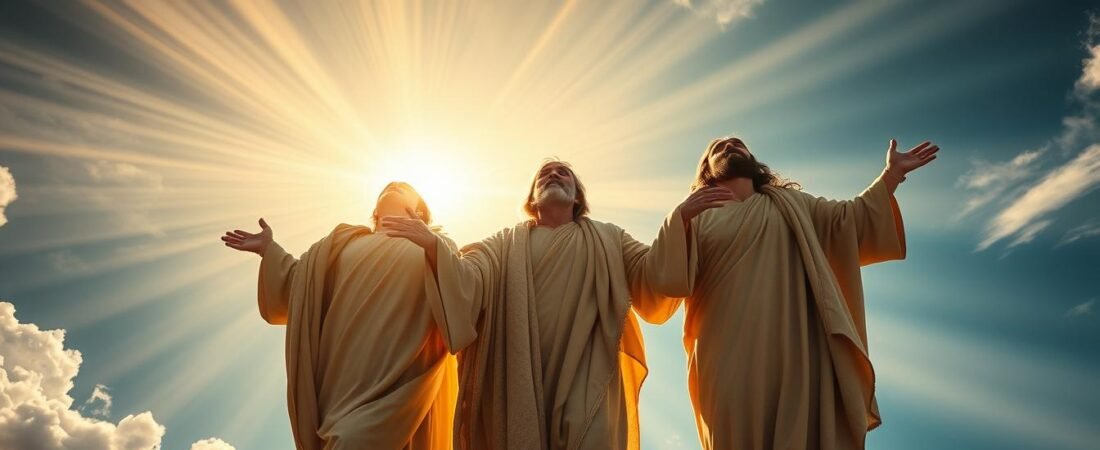The concept of being taken to heaven without experiencing death has long fascinated people. In the Biblical accounts, three figures stand out for their extraordinary experiences: Enoch, Elijah, and Melchizedek.
These biblical figures have been the subject of curiosity and awe for centuries, with their stories being told and retold throughout history. Their experiences, as recorded in the Old Testament, continue to captivate audiences today.
Key Takeaways
- The stories of Enoch, Elijah, and Melchizedek are significant in the biblical context.
- These individuals were taken to heaven without experiencing death.
- Their experiences have been interpreted in various ways throughout history.
- The biblical accounts of these figures continue to fascinate people today.
- Their stories offer insights into the cultural and religious contexts of the time.
The Extraordinary Phenomenon of Heavenly Ascension
The concept of heavenly ascension has fascinated believers for centuries, sparking intense theological debate. This phenomenon, where individuals are taken by God without experiencing death, is a rare and extraordinary event in religious lore.

Biblical Accounts of Ascension Without Death
The Bible provides accounts of individuals who were taken by God without dying. Enoch and Elijah are prime examples, with their stories being documented in the scriptures. Enoch’s ascension is described in Genesis 5:24, stating that he “walked with God, and then he was no more, because God took him away.” Elijah’s ascension, on the other hand, was dramatic, involving a whirlwind and a chariot of fire (2 Kings 2:11-12). These accounts have been the subject of much speculation and theological interpretation.
The Theological Significance of Being “Taken” by God
The theological significance of being “taken” by God lies in the demonstration of divine favor and the exception to the normal course of human mortality. It signifies that these individuals were specially chosen for a divine purpose. Their ascensions serve as a testament to the power and intervention of God in human affairs. The theological implications of these events continue to be a subject of interest and study among scholars and believers alike.
Enoch: The Man Who “Walked with God”
Enoch, a figure mentioned in the Book of Genesis, is known for his extraordinary relationship with God. This biblical character’s story is a fascinating aspect of religious lore, offering insights into faith, divine interaction, and the theological significance of being “taken” by God.

Enoch’s Lineage and Biblical References
Enoch’s lineage is traced back to Jared, as mentioned in Genesis 5:18-24. The biblical account highlights that Enoch “walked with God” and was taken by God without experiencing death. This narrative is significant not only for its theological implications but also for its portrayal of Enoch’s righteous character.
| Biblical Figure | Lineage | Notable Action |
|---|---|---|
| Enoch | Son of Jared | Walked with God |
| Adam | First man | Disobeyed God’s command |
| Noah | Son of Lamech | Built the Ark |
The Mystery of Enoch’s Translation to Heaven
The biblical account of Enoch’s translation to heaven is succinct yet profound. Genesis 5:24 states, “Enoch walked with God, and he was not, for God took him.” This verse has sparked extensive theological debate and speculation regarding the nature of Enoch’s ascension and its implications for understanding divine-human interaction.
“Enoch walked with God, and he was not, for God took him.” – Genesis 5:24
Enoch in Jewish and Christian Traditions
In both Jewish and Christian traditions, Enoch is revered for his faith and his unique relationship with God. The Book of Enoch, an apocryphal text attributed to Enoch, further elaborates on his prophetic role and visions, influencing religious thought and eschatology.
Enoch’s legacy as a biblical figure who “walked with God” continues to inspire theological reflection and spiritual exploration, underscoring the significance of faith and righteousness in religious narratives.
Elijah: The Prophet Who Rode a Chariot of Fire
In a spectacular display of divine power, Elijah was taken up to heaven in a chariot of fire. This event, recorded in 2 Kings 2:1-12, marks the dramatic conclusion to Elijah’s earthly ministry.
Elijah’s Ministry and Confrontation with Baal
Elijah’s prophetic ministry was characterized by his bold confrontation with the prophets of Baal on Mount Carmel. This pivotal event demonstrated the power of the true God over the idols of the time. Elijah’s unwavering commitment to God’s commandments and his fearless stance against idolatry are key aspects of his story.
| Event | Description | Biblical Reference |
|---|---|---|
| Confrontation with Baal’s Prophets | Elijah challenges the prophets of Baal, demonstrating God’s power. | 1 Kings 18:20-40 |
| Ascension to Heaven | Elijah is taken up to heaven in a chariot of fire. | 2 Kings 2:1-12 |
The Dramatic Ascension in a Whirlwind
The ascension of Elijah is a unique event in the biblical narrative. As Elijah and his successor, Elisha, journeyed together, they were suddenly separated by a chariot of fire and a whirlwind. Elijah was taken up to heaven, leaving behind his mantle, which fell to Elisha. This dramatic ascension underscored Elijah’s special status among the prophets.
“And Elijah said to Elisha, ‘Ask what I shall do for you, before I be taken away from you.’ And Elisha said, ‘I pray you, let a double portion of your spirit be upon me.’” (2 Kings 2:9).
Elijah’s Role in End-Time Prophecies
Elijah’s role extends beyond his earthly ministry, as he is expected to return before the day of the Lord, according to Malachi 4:5. This prophecy has been interpreted in various ways across different religious traditions. Elijah’s anticipated return is seen as a precursor to the Messiah, serving as a restorer and a call to repentance.
The story of Elijah, including his ascension and anticipated return, continues to captivate and inspire readers. His legacy as a prophet and his unwavering dedication to God serve as a powerful example of faith.
Melchizedek: The Mysterious Priest-King
In the biblical account, Melchizedek emerges as a priest-king, shrouded in mystery and significance. His appearance in the Book of Genesis is brief, yet it has a profound impact on biblical theology.
Melchizedek’s Brief Appearance in Genesis
Melchizedek is introduced in Genesis 14:18-20 as the king of Salem and a priest of God Most High. He blesses Abram and offers a sacrifice to God, demonstrating his priestly role. This encounter is significant as it establishes Melchizedek’s connection to the patriarchal figures and highlights his divine authority.
The Enigma of Melchizedek’s Origin and Fate
The biblical narrative does not provide details about Melchizedek’s ancestry or his death, adding to the enigma surrounding his person. The absence of a recorded genealogy or mortality details has led to various interpretations and speculations about his origin and fate. This mystery has contributed to Melchizedek’s intriguing presence in biblical literature.
Melchizedek as a Type of Christ in Hebrews
The Epistle to the Hebrews presents Melchizedek as a type or prefiguration of Jesus Christ, emphasizing his eternal priesthood. The comparison underscores the superiority of Christ’s priesthood over the Levitical order. This typology highlights the theological significance of Melchizedek in Christian theology, illustrating the continuity between the Old and New Testaments.
Melchizedek’s role as a priest-king symbolizes an eternal priesthood, foreshadowing the priestly work of Jesus Christ. The mysterious nature of Melchizedek continues to captivate scholars and believers, offering insights into the rich tapestry of biblical theology.
Enoch, Elijah, and Melchizedek – The Men Who Went to Heaven Without Dying!
Throughout history, the enigmatic figures of Enoch, Elijah, and Melchizedek have been revered for their extraordinary experiences of being taken to heaven without dying. Their stories, as recorded in biblical accounts, have not only fascinated religious scholars but have also had a profound impact on the broader cultural landscape.
Common Threads in Their Heavenly Journeys
Despite their distinct backgrounds and experiences, the stories of Enoch, Elijah, and Melchizedek share common themes. Their ascensions are often seen as demonstrations of God’s power and divine intervention in human affairs. These narratives also highlight the significance of faith and the rewards of a life devoted to spiritual pursuits.
Their Impact on Religious Thought Throughout History
The influence of Enoch, Elijah, and Melchizedek on religious thought has been profound and far-reaching. Their stories have shaped theological discussions around the concepts of immortality and the afterlife. Moreover, they have inspired countless believers to pursue a deeper understanding of their faith and its teachings.
Their Ascensions in Art, Literature, and Popular Culture
The ascensions of these three figures have been a rich source of inspiration in art, literature, and popular culture. From medieval paintings to modern literary works, their stories continue to captivate audiences, reflecting their enduring appeal and the timeless themes they represent.
Conclusion: What These Heavenly Journeys Teach Us Today
The stories of Enoch, Elijah, and Melchizedek offer a profound glimpse into the mysteries of life and our existence. Their experiences of heavenly ascension challenge conventional notions of mortality, inviting us to explore the transcendent possibilities within ourselves.
As we reflect on their spiritual journeys, we gain a deeper understanding of the human experience and our place within the broader narrative of existence. The accounts of Enoch, Elijah, and Melchizedek in biblical traditions encourage us to contemplate our own spiritual path and the possibilities that lie beyond our mortal existence.
By examining the significance of their ascensions, we can draw valuable lessons for our contemporary world. The extraordinary phenomena surrounding Enoch, Elijah, and Melchizedek continue to inspire and intrigue, offering insights into the nature of our existence and the potential for a deeper connection with the divine.

